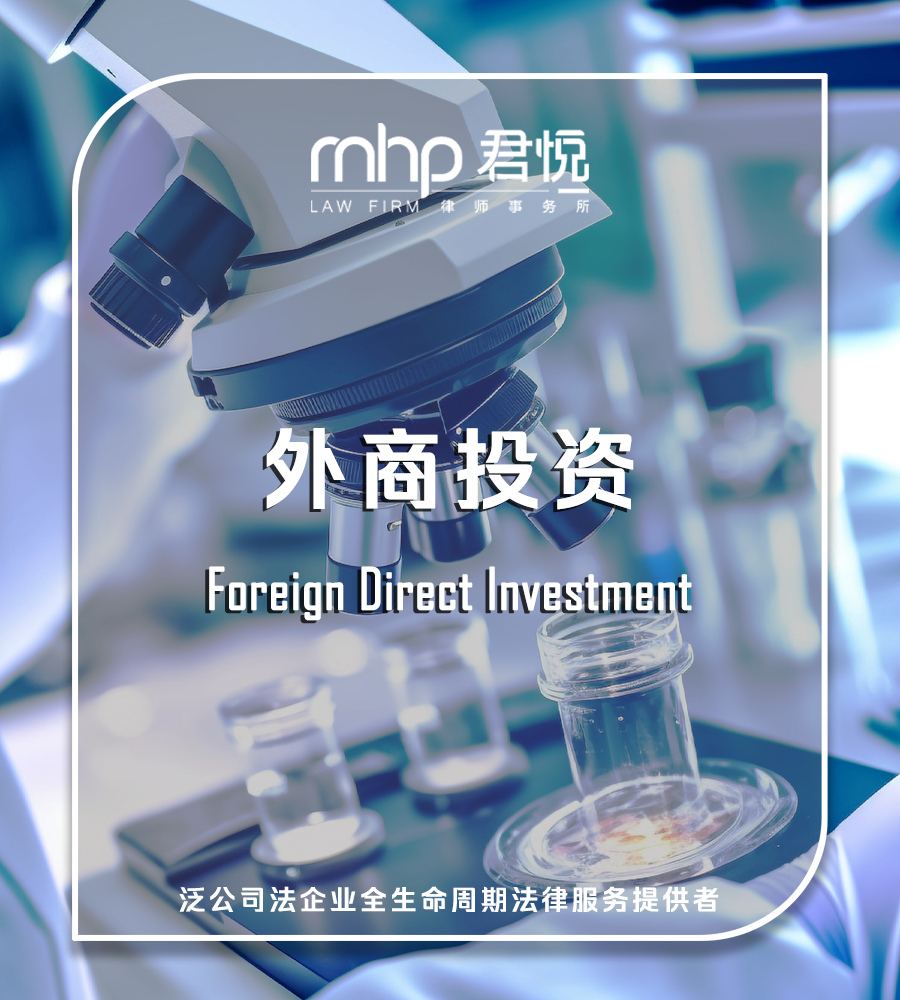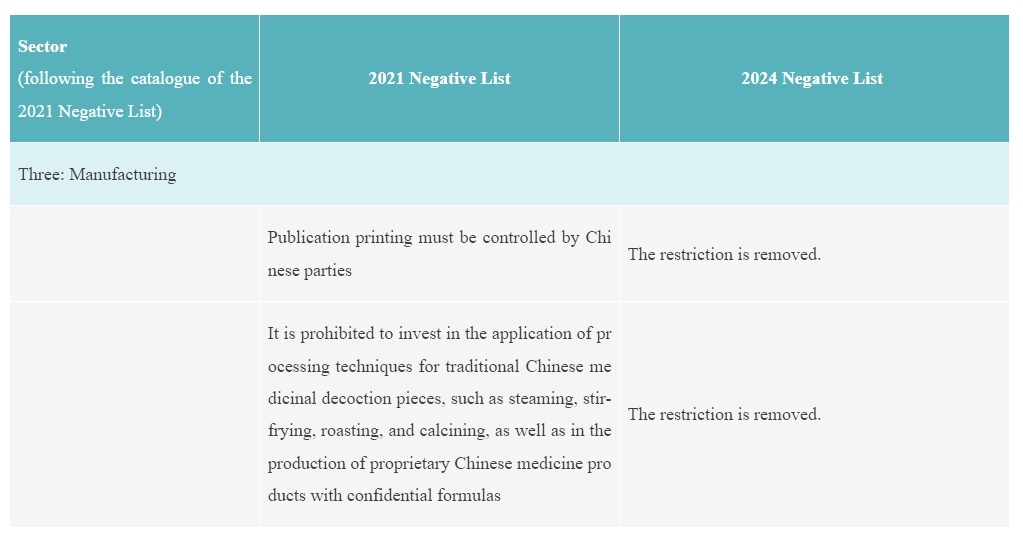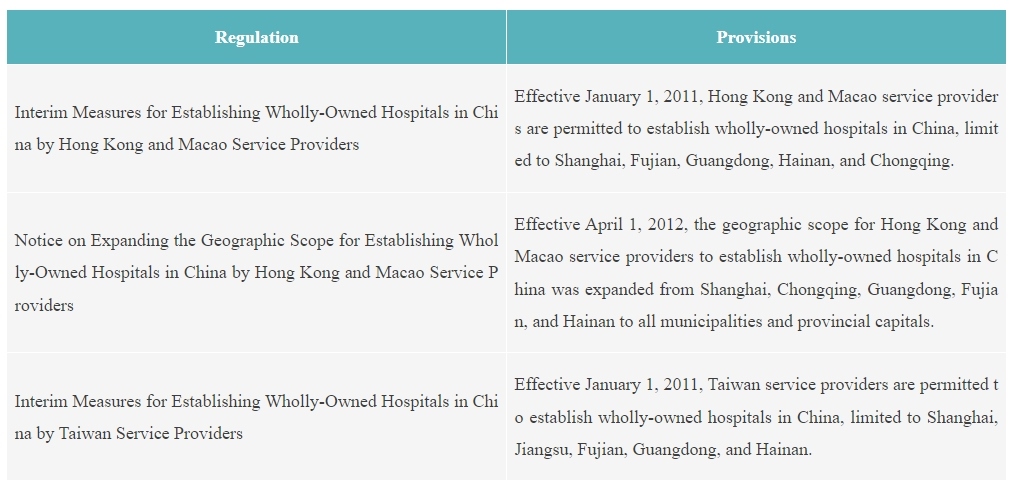Open a micro letter and sweep a two-dimensional code
Subscribe to our WeChat public number
Turn on the phone and sweep the two-dimensional code
You can access the website and share it with your friends through a mobile phone

In early September 2024, news about the “opening of foreign-funded hospitals” and “allowing foreign investment in human stem cell fields” appeared frequently. At the same time, the Special Administrative Measures (Negative List) for Foreign Investments Access was updated after a three-year hiatus. This article provides a brief introduction to the Special Administrative Measures (Negative List) for Foreign Investments Access (2024 Revision), released on September 6, 2024 (the “2024 Negative List”), as well as the policies concerning the opening of foreign-funded hospitals and human stem cell fields to foreign investment.
1. 2024 Negative List
The 2024 Negative List will come into effect on November 1, 2024. Meanwhile, the Special Administrative Measures (Negative List) for Foreign Investments Access (2021 Revision) (the “2021 Negative List”), issued by the National Development and Reform Commission and the Ministry of Commerce on December 27, 2021, will be repealed.
Compared to the 2021 Negative List, the 2024 Negative List reduces the items of special administrative measures for foreign investment access from 31 to 29. The main changes are summarized in the table below:

Sector (following the catalogue of the 2021 Negative List)2021 Negative List2024 Negative List Three:
(1) We can clearly see that the 2024 Negative List further expands the opening-up of the manufacturing sector, achieving no restriction in manufacturing, including:
The 2024 Negative List cancels the restriction that “publication printing must be controlled by Chinese parties”;
In the field of traditional Chinese medicine (“TCM”), China no longer prohibits foreign investors from investing in the processing techniques of TCM decoction pieces, such as steaming, stir-frying, roasting, and calcining, as well as in the production of proprietary TCM products with confidential formulas;
According to the Special Administrative Measures (Negative List) for Foreign Investment Access in Pilot Free Trade Zones (2021 Revision), from January 1, 2022, all restrictions on manufacturing in the free trade zones (“FTZ”) have been lifted. With the release of the 2024 Negative List, starting from November 1, 2024, the restriction on foreign investment in the manufacturing sector will be completely lifted nationwide, not just in the FTZs.
(2) Currently, the Special Administrative Measures (Negative List) for Foreign Investment Access in Pilot Free Trade Zones has not yet been updated, but we believe that the restrictions in the FTZs will also be further reduced, serving as a bellwether for the updated Special Administrative Measures (Negative List) for Foreign Investment Access.
(3) However, the 2024 Negative List still prohibits investments in “the development and application of human stem cells, gene diagnosis, and treatment technologies.” Therefore, the restriction on “the development and application of human stem cells, gene diagnosis, and treatment technologies” has not yet been lifted at the national level. As for “medical institutions,” investments are still limited to joint ventures at the national level.
2. Opening of Human Stem Cells in FTZs
Following the release of the 2024 Negative List, on September 8, 2024, the Ministry of Commerce, the National Health Commission, and the National Medical Products Administration jointly issued the Notice on Carrying Out the Pilot Work of Expanding Opening-up in the Medical Field (the “Notice”). The Notice provides that from the date of issuance of this Notice, foreign-invested enterprises are allowed to engage in the development and application of human stem cells, gene diagnosis, and treatment technologies in the China (Beijing) Pilot Free Trade Zone, China (Shanghai) Pilot Free Trade Zone, China (Guangdong) Pilot Free Trade Zone, and Hainan Free Trade Port for product registration for marketing, and production. All products that have been registered for marketing, and approved for production may be used nationwide.
In other words, although the “development and application of human stem cells, gene diagnosis, and treatment technologies” is not yet fully open at the national level, the state allows foreign investors to invest in these areas as part of the pilot program in the China (Beijing) Pilot Free Trade Zone, China (Shanghai) Pilot Free Trade Zone, China (Guangdong) Pilot Free Trade Zone, and Hainan Free Trade Port. Whether these technologies will be fully opened nationwide remains to be seen.
3. Opening of Foreign-Owned Hospitals in Pilot Regions
In addition to “the development and application of human stem cells, gene diagnosis, and treatment technologies,” the Notice further stipulates that the foreign-funded hospitals (excluding TCM hospitals and public hospital mergers) will be allowed to be established in Beijing, Tianjin, Shanghai, Nanjing, Suzhou, Fuzhou, Guangzhou, Shenzhen, and the entire Hainan Island. The specific conditions, requirements, and procedures for establishing foreign-funded hospitals will be announced later.
The Notice also breaks new ground in the field of medical institutions by no longer requiring foreign investors to form joint ventures in the pilot regions when investing in “medical institutions.” Previously, investors from Hong Kong, Macao, and Taiwan regions were already allowed to establish wholly-owned hospitals in the pilot regions:

However, it is worth noting that as early as ten years ago, the National Health and Family Planning Commission and the Ministry of Commerce issued the Notice on the Pilot Work of Establishing Wholly Foreign-Owned Hospitals in 2014.
Comparing the two notices, apart from slight differences in the pilot regions and wording, the general content is almost identical. Additionally, unlike the Notice on the Pilot Work of Establishing Wholly Foreign-Owned Hospitals, which specified “requirements for establishment” and “implementation and organization,” the Notice keeps “silent” on the specific conditions, requirements, and procedures for establishing foreign-funded hospitals.
We will keep an eye on the specific conditions, requirements, and procedures for establishing foreign-funded hospitals.

7F Wheelock Square, 1717 Nanjing West Road, Shanghai 200040, PRC
Zip Code:200040
Phone:+8621 61132988
Fax:61132913
Email:hr@mhplawyer.com